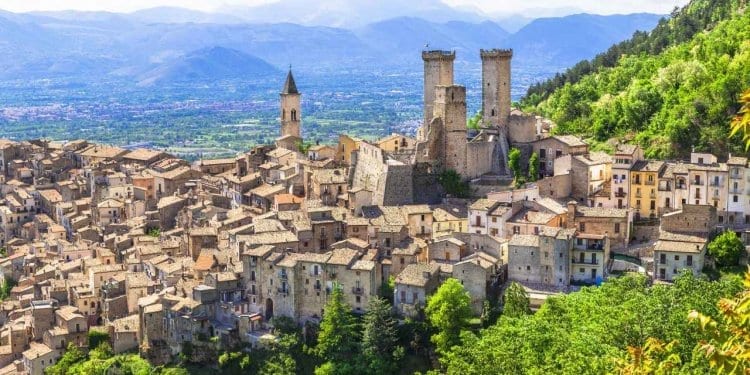Abruzzo is fantastically cheap.
You can eat like royalty here on a pittance. So much (pasta… wine… oil…) is produced locally and therefore super affordable.
Most locals shop markets and mom-and-pop stores. In every town or city across the region you’re able to shop at butchers, bakers, greengrocers, pasta makers, and sundry shops exclusively. There are supermarkets, of course, but forego them to get the really good stuff from the specialists.
Many locals even produce some of their own food, drastically cutting food costs. Expat couple Dave and Karen (who I introduced you to a while ago) are completely self-sufficient on just a couple of acres. They raise their own pigs, sheep, rabbits, chickens, and crops… and spend only about 700 euros per month to support their richly satisfying rural lifestyle.
Rent For 200 Euros Per Month
Likewise, housing in this part of Italy is cheap, whether you’re looking to rent or to buy. Renting in a city could run you between 700 and 1,200 euros per month for a 90-square-meter, two-bedroom apartment. In the country, rentals can be as affordable as 200 or 300 euros a month, usually including some land.
It’s worth noting that Italians aren’t typically renters. More than 80% of the population owns their home, so the rental mentality is missing here. Holiday rentals are easy to find, but the market isn’t flooded with long-term rental options… you’ll have to hunt a bit.
Mild Climate Means Comfortable Living Year-Round
The climate is mild enough to go without heating or cooling, but there are four seasons, so you’ll likely use air conditioning or heating for at least a few months a year. One upside is that most homes come with at least one fireplace that can help heat the house—and many have wood-burning ovens built into the kitchens.
The Best Things In Abruzzo Can Be Free
Entertainment options are mostly free. It costs nothing to enter and enjoy the national parks or to hit the beach. Movie tickets cost between 4 and 7 euros, depending on discounts.
If you’d like to have household help, maids, cooks, and nannies are reasonably priced (and many offer discounted rates to be paid under the table). Going through an agency you’d probably pay about 10 euros an hour… and maybe 7 euros per hour under the table.
Otherwise, your expenses could include car ownership (note that gas is expensive in Italy, about 1.20 euros per liter) and travel, domestic or international. Abruzzo can be a great location as a base for travel throughout Europe. Plane tickets from here to most places you’d want to go are cheap.
Health Care For 400 Euros Per Year
Italy’s health care is ranked #2 in the world, according to the WHO, and the country has the 14th highest life expectancy in the world, according the CIA Factbook.
There is a noticeable discrepancy between Italy’s private and public hospitals and also a discrepancy in care available in different regions of the country. Northern Italy is more affluent and tends to offer better public medical facilities… while the south, which is poorer, has lower quality public medical facilities.
The national health care system ensures health protection and assistance for all Italian citizens and is available to non-EU citizens who pay the minimal annual fee of about 400 euros per person. Enrollment takes place at the Azienda Sanitaria Locale (ASL) in your region.
If you aren’t covered by the national system, you must pay before receiving treatment, even if you have private medical insurance. Some foreign insurance companies have agreements in place to bill hospitals directly.
In contrast with public options, private hospitals are more like five-star hotels with the price tag you might expect for this standard of care. A stay in a private hospital can cost from 500 to 3,000 euros per day.
What’s On The Market In Abruzzo?
Countryside. Lots of it.
The majority of the region’s available property inventory is either rural or in the historic little mountain villages or towns (comune)—mostly country houses with land, farmhouses, and traditional Italian townhomes. It’s possible to find a property in move-in ready condition, but most require renovation.
Countryside properties often come with a couple of hectares of land, often already planted with grape vineyards, olive groves, and cherry or peach orchards. Some have fields growing crops like beans, lettuce, tomatoes, and squash on a small scale.
Abruzzo represents a great opportunity to go off-grid. Most properties could easily be made self-sufficient… and many dabble in winemaking or olive oil production.
You’ve got some direct beachfront or coastal real estate options available, too, but expect to pay a premium for a home on the water.
New construction and master-planned developments are practically nonexistent, especially in the historic villages and countryside.
A Foothold In The Boot
Property values in the hamlets and villages are severely depressed. The younger generation is moving to the bigger cities in search of better opportunities, leaving whole sections of some towns abandoned, houses falling into disrepair.
These kinds of properties can be had for as little as 5,000 euros.
These communities still maintain a strong sense of pride. Local officials are fighting to preserve their history and restore these vintage towns… meaning this is a chance to secure a home of your own in Italy at a bargain-basement price that could see a return of value.
That is to say, don’t discount capital appreciation when buying at today’s depressed rates… but don’t expect to see dramatic appreciation in the short term.
Holding costs are extremely low. Property taxes should be no more than 600 euros per year, utilities no more than 150 euros per month…
Kat Kalashian










